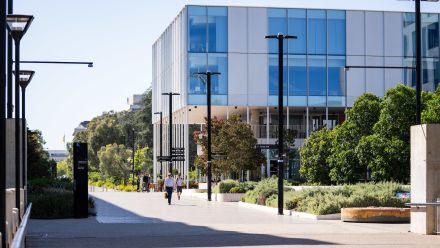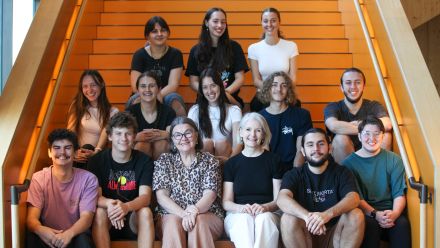Frequently Asked Questions (FAQs) - NSSS 2021
New questions
Added Tuesday 28 September.
I recently graduated but have been invited to do the survey. Should I?
We encourage you to do the survey even if you recently graduated from the University. Your experiences will help guide further action and policies for current and future students.
Please answer as best you can from your experience in your last semester.
I haven't experienced sexual assault or sexual harassment. Should I still participate in the survey?
No matter your circumstances, views or experiences, your participation in the survey is important as it will help ensure the results of the study accurately represent the views of all students at your university.
We encourage you to do the survey, regardless of whether you have or haven't experienced inappropriate or illegal behaviour yourself.
Do I need to answer all the questions?
There are options to select "I don't know" for questions you don't have an answer to or would prefer not to answer.
Can I stop and start the survey if I need to?
Yes. You will be able to stop and re-start the survey at any time to ensure you can take breaks, if you need.
You can save your progress at any time and use the same links in the invitation/reminder emails to return to the survey and continue from where you left off.
If you have trouble opening the survey, please try accessing it from a different device such as a mobile phone or computer. If you do not have an alternative device, try accessing it in a different web browser, or through a different internet connection.
Please also access support if you need it, and we have a number of free support services available for our community.
Will anyone be able to identify me?
No - the survey results will be confidential, de-identified and aggregated.
How can I participate if I am not invited to complete the survey?
You can disclose an incidence of sexual misconduct using the . &˛Ô˛ú˛ő±č;&˛Ô˛ú˛ő±č;
The Social Research Centre is also running a  on students' experience of sexual harassment, sexual assault or unwanted sexual behaviour. Any student who has been enrolled in an Australian university during the past five years can participate. No matter your circumstances, views or experiences, your participation is welcomed. All responses are anonymous and confidential. You can take as much time as you need to share your experiences. &˛Ô˛ú˛ő±č;
How does COVID-19 impact the survey and its results?
The survey will ask you about your experience of violence since starting university, regardless of where it occurred. If you have experienced violence, you will also be asked whether this occurred at university, including at any kind of university event, place, or occasion, whether on or off campus or online.
There are concerns worldwide that COVID-19 may have led to an increase in gender-based violence and online abuse.
What is my username to access the survey?
To access the survey, please use the link in the invitation/reminder email.
If you have trouble opening the survey, please try accessing it from a different device such as a mobile phone or computer. If you do not have an alternative device, try accessing it in a different web browser, or through a different internet connection.
If you can't find an email with the access link, or forgot your login details, please contact the Social Research Centre by phone: 1800 023 040 or email: . They can provide you with your login details.
Who can I contact for support?
Please access support if you need it, and we have a number of free support services available for our University community.
If you have any questions about being invited to participate in the survey, or you would like to opt out of the study, please contact 1800 023 040 or .
General
What is the 2021 National Student Safety Survey?
The survey will collect data on the scale and nature of university student experiences of sexual assault and sexual harassment.
It is funded by the university sector's Respect. Now. Always. initiative - a sector-wide program that aims to prevent sexual violence in university communities and better support those who have been affected.
The survey will take 10-12 minutes to complete.
Do I have to complete the survey?
You don't need to do the survey, if asked. There are other ways to share your experiences.
I didn't receive an invite to participate in the survey. How can I share my story?
- You can disclose an incidence of sexual misconduct using the . &˛Ô˛ú˛ő±č;
- The Social Research Centre is also running a qualitative research project on students' experience of sexual harassment, sexual assault or unwanted sexual behaviour. Any student who has been enrolled in an Australian university during the past five years can participate. No matter your circumstances, views or experiences, your participation is welcomed. All responses are anonymous and confidential. You can take as much time as you need to share your experiences. &˛Ô˛ú˛ő±č;
Who is conducting the survey?
The Social Research Centre (SRC) is conducting the survey in partnership with leading violence prevention expert Associate Professor Anastasia Powell of RMIT University.
How long will the survey be open?
The national survey will be open from Monday 6 September to Sunday 3 October 2021.
Support
The survey has caused some distress for me. What kinds of support can şÚÁĎĚěĚĂoffer me?
Conversations about sexual assault and sexual harassment can be difficult and challenging. If you, or an şÚÁĎĚěĚĂcolleague, peer or friend, needs support, please access it.
Disclosures
How can I disclose sexual misconduct?
You can disclose an incidence of sexual misconduct using the .
For more information, visit: /students/health-safety-wellbeing/living-respectfully/how-to-disclose-sexual-misconduct.
Will my disclosure through the survey implicate the people mentioned or lead to charges?
Responses to the survey are kept confidential and do not constitute an official report to the University or to the police about an incident.
Your responses will be combined with responses from other students at your university and across Australia for analysis. The results of this will be shared with universities to inform their understanding of students' experiences and improve services and responses for students.
Someone disclosed to me. What should I do to help?
If a friend has disclosed that they have experienced sexual assault or sexual harassment, there are things you can do to support them.
- Believe them: Validate with affirming statements, don't inquire or investigate with leading questions.
- Respect confidentiality: Unless someone is in danger, do not tell anyone else what your friend has told you without their permission.
- Make sure that your friend is in charge of what happens next: You can offer to find out information about support services, and the options available to your friend, but it is important that you allow your friend to make their decisions and that you respect what they have chosen to do.
Someone disclosed to me and I'm not feeling OK. What support is available to me?
When a friend tells you that they have experienced sexual assault or sexual harassment, it's normal to feel a lot of different emotions. Hearing that someone you care about is in distress is not easy. You, as well as your friend, deserve care and support.
Data, privacy and survey logistics
Visit the FAQs prepared by Universities Australia: .


